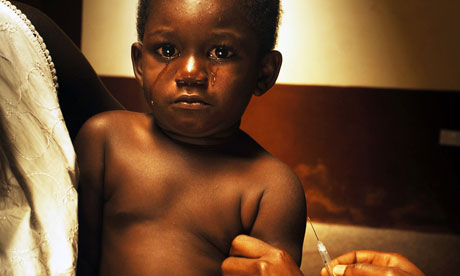Why fear of vaccination is spelling disaster in the developing world
READ THE FULL ARTICLE AT THE GUARDIAN
Anti-vaccination scares are as old as vaccination itself – but now they are putting lives at risk in the developing world

Rumours about vaccines are threatening to derail vital health programmes in the developing world. Photograph: Shaul Schwarz/Getty Images
Vaccine scares are nothing new. When Edward Jenner first pioneered the use of the mild disease cow pox to innoculate against the deadly small pox in the 18th century, satirists drew cartoons of vaccinated patients sprouting cow’s heads. Now, it seems, every country in the developed world has their own type of scare. In France, protesters claim that the hepatitis B vaccines cause multiple sclerosis, in the US, that the vaccine’s mercury additives are responsible for the rise in autism. In the UK, there was a furore over whooping cough and then, famously, MMR. All have been exposed as groundless fears, yet anti-vaccine feeling continues to reverberate on the the internet. Now doctors warn that such rumours from the UK, Europe and the US are spilling over into the developing world, where they are threatening to derail global vaccination programmes. Terrifyingly, this means putting the lives of thousands of children at risk.
In South Africa, concerns about MMR, generated by coverage in the rest of the English-speaking world – including the UK – have led to an unwillingness to receive the vaccine, and there has been an outbreak of nearly 7,000 cases of measles. For children with poor health and limited access to medical services, this decision has been disastrous. There have already been hundreds of deaths.
Meanwhile, in India the government has recently overturned recommendations from its own scientific advisers to include the Hib (shorthand for a bug called Haemophilus influenzae) vaccine in its basic childhood programme, despite the fact that the World Health Organisation says that 20% of the 400,000 childhood deaths from pneumonias caused by Hib worldwide occur in India. In the UK, childhood Hib vaccination has seen Hib-caused meningitis (the more common Hib illness in the developed world) fall away to almost nothing. Yet Indian lobbying groups, led by opposition politicians, still claim that Hib vaccines are not only unnecessary, but have caused a number of deaths. The tactics of the Indian anti-Hib groups draw directly on the work of UK and US anti-vaccine websites.
Our anti-vaccine fears, and the groups set up to highlight them in the developed world, may not directly cause these problems, but are “fuelling and amplifying them”, according to Dr Heidi Larson of the vaccine programme and policy group at Imperial College London. Shockingly, just five minutes spent looking at websites critical of vaccines increases your perceptions of the risks, and reduces the perceptions of the risks of not being innoculated, according to a recent paper from a German group published in the Journal of Health Psychology. Rumours about vaccines quickly gain credence in the internet hothouse, with sites feeding off each other. Many sites will tell you that four girls in India died within 24 hours of receiving HPV vaccines. What they don’t say is that two died in road crashes, one from a snake bite, and one fell down a well. Add this rumour to the feeling that vaccination is something that is done to you by government, by global agencies or by big pharmaceutical companies, and conspiracy theories are virtually guaranteed.
So what can be done? So far, campaigners have insisted on more information, awareness and education. But this approach has failed. Instead, the idea of each country taking ownership is being explored, along with advocacy and immediate action to quell rumours.
READ THE FULL ARTICLE AT THE GUARDIAN
No comments:
Post a Comment
Please keep posts here respectful. Those that cross boundaries will be deleted, and then placed in a special place for future ridicule.